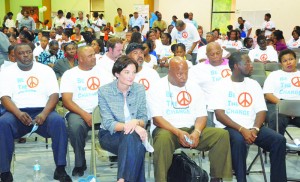
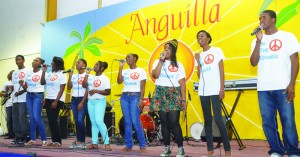
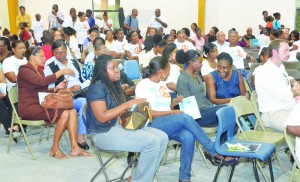
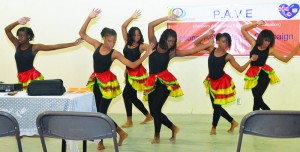
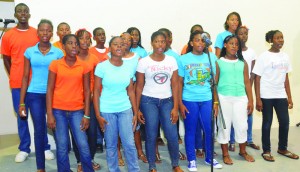
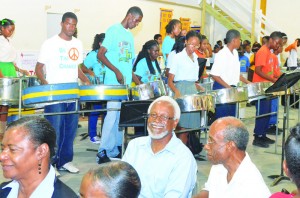
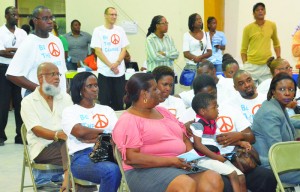
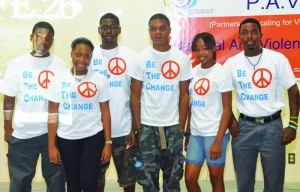
A National Anti-Violence Campaign, which is expected to be of much value to positive behaviour in Anguilla, was launched at the Rodney McArthur Rey Auditorium on Friday, January 24, by the Ministry and Department of Social Development. The initiative, dubbed PAVE, (acronym for Partners Advocating for Violence Eradication), has as its theme: “Leading the way to a safer Anguilla”.
Anguilla’s Governor, Her Excellency Christiana Scott, posed the question: “Is the desire to end violence strong enough that each of us is willing to change our behaviour and take some action?” Answering that question herself, she stated: “I firmly believe that the people of Anguilla have the ability to come together and lead the change they want to see. To do that, they need to look outside their villages and neighbourhoods. The issue can only be tackled if everyone, despite the terrible hurts which have been suffered by all communities, can find it in themselves to step back and look at this beautiful island as a whole.”
The Governor continued: “I have spoken to families affected by violence right across the island. The pain felt by grieving parents is the same; the anger felt by friends of young people killed in their prime is the same; the concern that our public services, police and the criminal justice system must work harder to keep us safe is the same; the desire to end violence is the same. So much more unites communities across this island than divides them, and today’s showing by organisations from every area underlines that. But looking at the bigger picture is not sufficient. We need to turn hurt and tears and words into action. We cannot allow events like tonight’s simply to be enjoyable one off events. It must start a deeper process of change. It must challenge people in authority who are complacent about the issues. It forces us to be true leaders. It should “strike out” from the vocabulary of any public servant who says it is not in my job description and it is somebody else’s problem. It needs to empower those at the ground level to hold to account those in authority when we do not work hard enough for you; and it should listen to the voice of our young people…about how this island is governed and make their future a priority today; and it should help law-abiding citizens to make clear to those who commit crimes that Anguilla will not tolerate their cowardly use of violence. And to those who think that violence is acceptable, I simply say this: you are damaging yourselves; you are damaging your families; and you are damaging your communities – and you have important decisions to make.”
Governor Scott expressed much interest in a series of short films on anti-violence which were prepared for the occasion. “I think they demonstrate a real determination for people across the island to come together and turn our commitment into practical action, which I hope would really change the behaviours of those who think violence is acceptable,” she stated. The Governor congratulated everyone involved in the films, and generally in the organisation of the event.
Chief Minister Hubert Hughes prefaced his remarks by declaring that: “If Anguilla is to return to the civil society it was, the church will have to play a pivotal role because you have to volunteer to be different; to be good citizens; and you have to volunteer to guide those who need guidance.”
Mr Hughes said he had promoted Anguilla around the world as a non-crime, peaceful and loving destination for tourists and was delighted that visitors had told him that the island’s greatest assets were its people. “We will all agree that the escalation of violence in Anguilla over the last few years, has reached a stage where it is of great national concern,” he went on. “While it is true that the majority domiciled in Anguilla are law-abiding citizens, it is the cruel elements that make the headlines.”
The Chief Minister praised the anti-violence committee, operating as PAVE, for embracing a very commendable approach to violence eradication. “The strength of the organisation, in my view, lies in the notion of partnership and this is a key element if success is to be achieved,” he stated. “A question which has bothered me, for quite a long time, is what is the reason Anguillians who, in some cases, have known each other all their lives, are today are committing violent acts against each other including murder?.” He stressed that in order to deal effectively with the matter, there must be an approach not only involving law enforcement personnel, but also various institutions, community organisations, community leaders and, very important, the criminals themselves.
Mr Hughes called for the momentum at the launching of the national anti-violence campaign to be continued over time so that there could again be an absence of violence on the island.
Mr Jerome Roberts, Minister of Home Affairs, regretted that Anguilla had reached a stage where it had become necessary to launch a national campaign against violence. He joined in commending P.A.V.E. for its efforts aimed at eradicating violence in Anguilla. He was appreciative of the collaborative approach to tackling the issues of violence and sending a message to the entire island that all persons need to be partners in the effort.
“As citizens of Anguilla, we all want to be safe,” he stated. “We don’t have to think twice about where was can go on this little 35 square mile island. We don’t want to be fearful of entering our homes at night, or going outside after a certain hour. We yearn for: the Anguilla in which citizens are not violated, injured or killed by those who seem to have no compassion or regard for human life; the Anguilla in which we do not use weapons to resolve differences; the Anguilla in which you don’t have to worry about being in the wrong place at the wrong time. We yearn for this Anguilla, but we have to do more than yearn. We have to do more than talk. We have to act. When I say we, I am referring to every single citizen and resident of Anguilla. There is a role for each of us in this effort to eradicate violence from our society.”
The Minister went on: “Parents, your role is to ensure that not only do you feed and clothe your children, but that you are good role models, you instil sound morals in them and give them the tools to make good choices. Members of the wider community, your role is to help to raise the children in the community. Encourage them to be good citizens, admonish them when you see them going astray. Organise activities in your community to keep them positively engaged, or join an organisation (many are here today), that already engages children so you can help them to do more. Teachers, use the opportunities you have not only to teach the curriculum but to instil the virtues of respect, tolerance and compassion. Children and young people, think before you act. Think about the possible consequences of your actions. In every situation with which you are faced, you have a choice. Choose to do the right thing; choose the way that promotes peace and reconciliation; choose the way that will not rob you of the bright future you want for yourselves. Encourage your peers to make good choices as well.”
Mr Roberts further said: “All citizens, we also have a role not in facilitating criminals. Violence cannot be eradicated when the message we are sending to criminal is that they are protected by our silence and non-cooperation. Criminals thrive in these environments. We have allowed them to control us through fear. So long as this continues, violence will continue to escalate. Commissioner, and other ranks of the Royal Anguilla Police Force, continue to do your best. Your efforts are not always recognised and appreciated, but where would we be if you were not there? Continue to build relations with each community so that persons can feel comfortable coming to you. As for Government, we have to increase our efforts to strengthen the institutions that serve children and young people, and to build capacity to deal with the variety of issues we now face. Through PAVE, we must also continue to coordinate and lead the national effort to reclaim a peaceful Anguilla.”
Commissioner of Police Rudolph Proctor was pleased with the efforts of the organisers of PAVE to assist the police in eradicating violence in Anguilla. He said there was a need for commitment and action to seriously confront the threat posed to the island by a few idle and dysfunctional young people. “One can only imagine the pain and hurt that families face when the reality of a family member or a child is brutally gunned down for no apparent reason,” he said.
Mr Proctor was certain that the violence on the island can be eradicated, but stressed that the community must stand up against it and join the police and other organisations and partners like PAVE in that effort. He reported that since 2012, twelve persons lost their lives in Anguilla as a result of gun violence – by the use of illegal weapons – thus causing much pain to families and Anguilla on a whole.
“Though we have the remit to prevent violent acts from occurring, and bring the perpetrators to justice, it remains a task that we cannot do alone,” said the Commissioner, in calling for the assistance of the public.
Mrs Chanelle Petty Barrett, Permanent Secretary Education, gave an overview of PAVE. She said it was established in March 2013. “It is a stakeholder body that works in collaboration with the Ministry of Social Development and the Department of Youth and Culture,” she explained. “It is to formulate and implement national initiatives to combat violence and other criminal behaviour. Among its members are representatives from the Ministry of Social Development, the Departments of Youth and Culture, Sports, Education, Probation, Social Development and Labour; the Anguilla Bar Association; the Anguilla National Youth Council and the National Youth Ambassador Corps; the Royal Anguilla Police Force; the Anguilla Red Cross; the Anguilla Christian Council; the Anguilla Evangelical Association; and the Anguilla Hotel and Tourism Association.”
Mrs Petty Barrett said that when PAVE was first put together the whole idea was to have a collaborative approach to tackle the issue of violence in the community. She added that this was after the Ministry of Social Development and the Department of Youth and Culture had spent considerable time putting their heads together to come up with ideas to combat the problem of violence. She observed that there were other organisations on the island working towards the same goal, and encouraged them to come on board with PAVE.
Among the highlights of the event was the presentation of a number of film episodes, produced by Mr Crispin Brooks and scriptwriter Mr Dwayne Adams, depicting violence in Anguilla and the need for eradication. The actors were largely students of the Albena Lake-Hodge Comprehensive School, whose performances attracted much applause from the large audience.
Other participants at the launch of the Anti-Violence Campaign included Ms Shellya Rogers, Programme Officer at the Department of Youth and Culture who chaired the ceremony; Pastor Phillip Gumbs who delivered the opening prayer and led a group presentation of a song written and composed by him entitled “One Family;” Mr Bren Romney, Director of the Department of Youth and Culture (DYC), who gave the welcome remarks; Mr Michali Rey, President of the National Youth Council; Mr Dwayne Adams, who gave an overview of “Life .264” the title of his script for the anti-violence films; Mrs Hyacinth Bradley Senior Programme Officer DYC,, who delivered the Vote of Thanks; and Mr Sanford Richardson, Commissioner of the Department of Social Development, who presented the Benediction.







